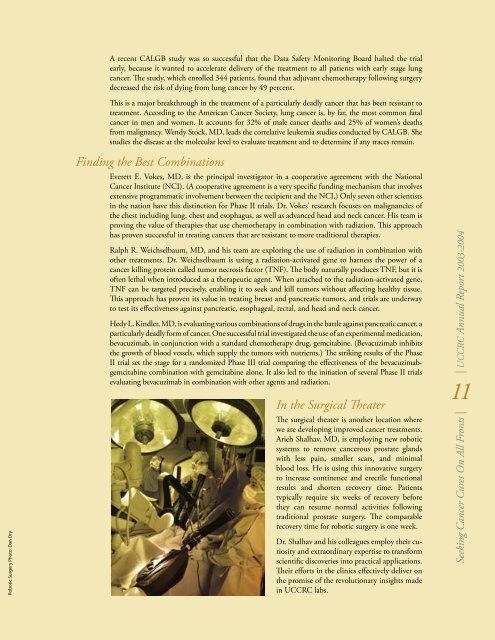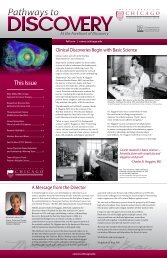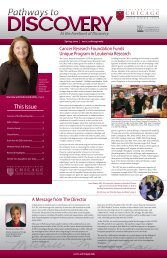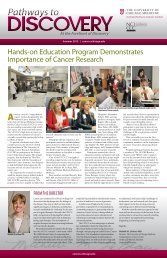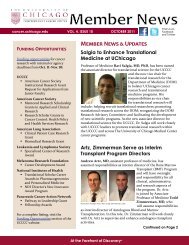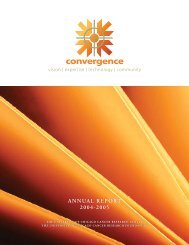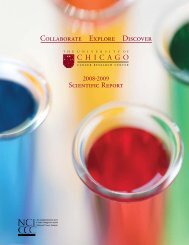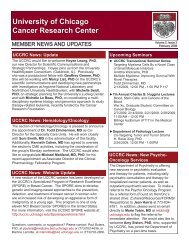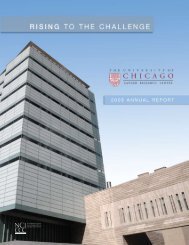ANNUAL REPORT 2003-2004 L REPORT Cancer Cures On All Fronts
ANNUAL REPORT 2003-2004 L REPORT Cancer Cures On All Fronts
ANNUAL REPORT 2003-2004 L REPORT Cancer Cures On All Fronts
Create successful ePaper yourself
Turn your PDF publications into a flip-book with our unique Google optimized e-Paper software.
A recent CALGB study was so successful that the Data Safety Monitoring Board halted the trial<br />
early, because it wanted to accelerate delivery of the treatment to all patients with early stage lung<br />
cancer. The study, which enrolled 344 patients, found that adjuvant chemotherapy following surgery<br />
decreased the risk of dying from lung cancer by 49 percent.<br />
This is a major breakthrough in the treatment of a particularly deadly cancer that has been resistant to<br />
treatment. According to the American <strong>Cancer</strong> Society, lung cancer is, by far, the most common fatal<br />
cancer in men and women. It accounts for 32% of male cancer deaths and 25% of women’s deaths<br />
from malignancy. Wendy Stock, MD, leads the correlative leukemia studies conducted by CALGB. She<br />
studies the disease at the molecular level to evaluate treatment and to determine if any traces remain.<br />
Robotic Surgery Photo: Dan Dry<br />
Finding the Best Combinations<br />
Everett E. Vokes, MD, is the principal investigator in a cooperative agreement with the National<br />
<strong>Cancer</strong> Institute (NCI). (A cooperative agreement is a very specific funding mechanism that involves<br />
extensive programmatic involvement between the recipient and the NCI.) <strong>On</strong>ly seven other scientists<br />
in the nation have this distinction for Phase II trials. Dr. Vokes’ research focuses on malignancies of<br />
the chest including lung, chest and esophagus, as well as advanced head and neck cancer. His team is<br />
proving the value of therapies that use chemotherapy in combination with radiation. This approach<br />
has proven successful in treating cancers that are resistant to more traditional therapies.<br />
Ralph R. Weichselbaum, MD, and his team are exploring the use of radiation in combination with<br />
other treatments. Dr. Weichselbaum is using a radiation-activated gene to harness the power of a<br />
cancer killing protein called tumor necrosis factor (TNF). The body naturally produces TNF, but it is<br />
often lethal when introduced as a therapeutic agent. When attached to the radiation-activated gene,<br />
TNF can be targeted precisely, enabling it to seek and kill tumors without affecting healthy tissue.<br />
This approach has proven its value in treating breast and pancreatic tumors, and trials are underway<br />
to test its effectiveness against pancreatic, esophageal, rectal, and head and neck cancer.<br />
Hedy L. Kindler, MD, is evaluating various combinations of drugs in the battle against pancreatic cancer, a<br />
particularly deadly form of cancer. <strong>On</strong>e successful trial investigated the use of an experimental medication,<br />
bevacuzimab, in conjunction with a standard chemotherapy drug, gemcitabine. (Bevacuzimab inhibits<br />
the growth of blood vessels, which supply the tumors with nutrients.) The striking results of the Phase<br />
II trial set the stage for a randomized Phase III trial comparing the effectiveness of the bevacuzimabgemcitabine<br />
combination with gemcitabine alone. It also led to the initiation of several Phase II trials<br />
evaluating bevacuzimab in combination with other agents and radiation.<br />
In the Surgical Theater<br />
The surgical theater is another location where<br />
we are developing improved cancer treatments.<br />
Arieh Shalhav, MD, is employing new robotic<br />
systems to remove cancerous prostate glands<br />
with less pain, smaller scars, and minimal<br />
blood loss. He is using this innovative surgery<br />
to increase continence and erectile functional<br />
results and shorten recovery time. Patients<br />
typically require six weeks of recovery before<br />
they can resume normal activities following<br />
traditional prostate surgery. The comparable<br />
recovery time for robotic surgery is one week.<br />
Dr. Shalhav and his colleagues employ their curiosity<br />
and extraordinary expertise to transform<br />
scientific discoveries into practical applications.<br />
Their efforts in the clinics effectively deliver on<br />
the promise of the revolutionary insights made<br />
in UCCRC labs.<br />
Seeking <strong>Cancer</strong> <strong>Cures</strong> <strong>On</strong> <strong>All</strong> <strong>Fronts</strong> | | UCCRC Annual Report <strong>2003</strong>-<strong>2004</strong><br />
11


